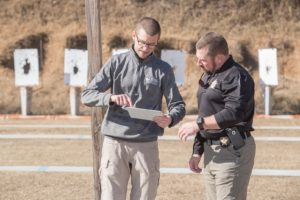 Stress can make a law enforcement officer’s brain function worse at precisely the wrong moments.
Stress can make a law enforcement officer’s brain function worse at precisely the wrong moments.
Richard Cleveland, assistant professor and program coordinator in the Counselor Education program at Georgia Southern University, explores how mindfulness can help bring the world back into focus during stressful situations.
Richard is assistant professor and program coordinator in the Counselor Education program at Georgia Southern University. Richard’s scholarly interests include mindfulness; survey psychometrics; client spirituality in counseling, and data-driven comprehensive school counseling programs.
Richard is currently directing the Mindfulness-Based Tactical Instruction (MBTI) research project representing secured funding for a multi-agency investigation into the role of mindfulness mitigating officers’ stress during tactical situations requiring use of force. The current project is a collaboration between university police, city police, county sheriff’s department, and Federal Training agencies.
Law Enforcement in Stressful Situations
Law enforcement officers engaged in tactical or use-of-force situations frequently experience incredible stress. Stress where the sympathetic nervous system kicks in and takes over. The heart rate increases, there’s an adrenaline dump, senses are heightened, tunnel vision can set in, and higher cognitive functioning becomes more difficult.
During these times, officers navigate complex and at times asymmetrical situations with their cognitive energies hindered. Agencies train for different scenarios, incorporate reality-based exercises, and even implement stress-inoculation training, but an innovative approach towards addressing this challenge may be though mindfulness.

Mindfulness is frequently described as non-judgmental, present-moment awareness. An ability to attend to sensations physical and mental with a detached stance. Rather than being, “stuck on auto-pilot”, mindfulness seeks to open our eyes, our senses, our whole selves – to awareness of the moment. As parasympathetic functioning takes over, officers are able to attend to the sensations without falling into a frozen state. Attending to, and recognizing physical, emotional, and mental sensations, officers are better able to navigate high-stress incidents with far more cognitive energies at their disposal.
Arguably, tactical training is not what comes to mind when most people think of mindfulness. But one of the true aims of mindful awareness is practicing compassion towards oneself and others. What better time and place for compassion than incidents requiring intervention and potential deadly force.
